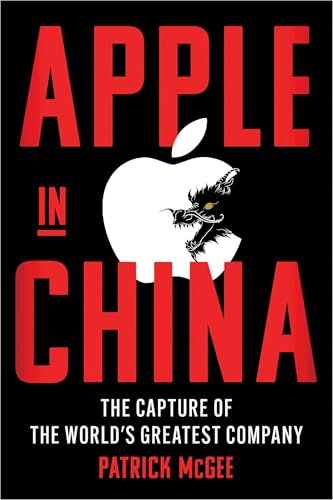Review of Apple in China
by Johny McFliggen, PhD Literature & Business, Oxford
In the maelstrom of modern corporate literature, "Apple in China" by Patrick McGee emerges as a formidable examination of one of the most complex and symbiotic relationships in the global economy. With the precision of a seasoned journalist, McGee dissects Apple's intricate dance with China, a relationship as interconnected and fraught as the synapses in a neural network.
At first glance, the title might suggest a mere chronicle of Apple's ventures into the lucrative Chinese market. However, McGee does not settle for the pedestrian narrative. Instead, he crafts a compelling tapestry that intertwines geopolitical tensions, economic strategies, and cultural negotiations. The reader is taken on a journey that reveals how Apple's strategic decisions are not merely business maneuvers but are influenced by larger forces, including global trade policies and the ever-shifting landscape of international diplomacy.
McGee's background in business journalism is evident as he navigates the labyrinthine supply chain networks that Apple has established in China. His analysis is reminiscent of Brian Merchant’s "The One Device," yet where Merchant delves into the creation of the iPhone, McGee expands his lens to capture the broader industrial ballet that Apple orchestrates across Chinese soil. The book's narrative doesn't just stop at the factory gates; it explores the very ethos of Apple's operational philosophy and its palpable impact on Chinese consumer culture.
Reading "Apple in China," one cannot help but draw parallels to Kai-Fu Lee's "AI Superpowers." While Lee explores the titanic clash between American and Chinese tech giants for artificial intelligence dominance, McGee offers an equally gripping account of how Apple navigates its precarious alliance with a nation that serves both as its manufacturing powerhouse and its most significant market. This delicate balance is akin to walking a tightrope above geopolitical fault lines, with potential pitfalls at every step.
In a world where corporate behemoths often operate behind veils of public relations gloss, McGee's book is refreshingly forthright. He peels back layers of corporate strategy to reveal the gritty reality of Apple's dependence on China—an Achilles' heel that could either propel it to new heights or become its undoing. The narrative does not shy away from exploring controversial topics, such as labor practices within Chinese factories and the ethical implications of doing business in a country with starkly different views on information control and privacy.
Perhaps what sets "Apple in China" apart is McGee's ability to weave his narrative with both analytical rigor and an engaging prose style. His insights are sharp, his arguments cogent, and his storytelling adept at capturing the reader’s imagination. This is not just a book for business aficionados but also for anyone interested in understanding how global economic forces shape our everyday lives.
In conclusion, "Apple in China" is not merely a book about a company's expansion into foreign territory; it is an exploration of how modern corporations must adapt, compromise, and innovate in an era defined by rapid technological change and political uncertainty. As Apple continues to navigate its complex relationship with China, McGee’s book will remain a critical resource for understanding one of the most significant economic partnerships of our time.
Purchase Link: Apple in China on Amazon



